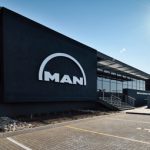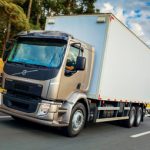From Sweden to South Africa

Volvo Group Southern Africa president Torbjörn Christensson has a rich history in the automotive industry, which he is applying in the region’s expansion markets … keeping to the basics of putting the customer first
Christensson has a long involvement in the automotive industry and specifically with Volvo for the past twelve years. He started with the company as the deputy aftermarket director and service director at Volvo Trucks in Gothenburg, Sweden, after leaving Saab Automobile AB – where he held various managerial positions.
Christensson’s executive streak continued at Volvo as he was promoted to commercial aftermarket director from his deputy aftermarket and service director position. In 2009, Christensson climbed another of the corporate ladder’s steps as he advanced to managing director of Volvo Denmark – situated in the country’s capital, Copenhagen.
From here Christensson emigrated once more, leaving Europe behind to call South Africa his new home. He took responsibility of the Volvo Group Southern Africa’s (SA’s) truck business – which includes Volvo, Renault and UD Trucks – and its activities in the expansion markets in the region, during 2012.
This is ideal as Christensson has a strong aftermarket focus, which was honed during his European service director days when he was responsible for the more than 1 100 workshops in the region.
“I strongly believe that if you want to continue growing your market share, your aftermarket service has to be outstanding. You have to be customer-focused and if you get that right, your customers will stick with you through the good and the bad times,” says Christensson. “Fortunately, I believe that this has been one of our Group’s strong points over the years; building relationships with customers and providing them with customised solutions that suit each of their unique requirements.”
And this is exactly what the Volvo Group is doing in southern Africa, as it has a comprehensive dealer network for its various brands across the region. UD Trucks has more than 50 dealers in southern Africa, while Renault Trucks and Volvo Trucks are developing and growing the footprint. Wherever viable, the Group is offering aftermarket services for all three of its brands in one dealership.
“As transport operators expand their operations throughout the region, we believe the various brands within the Volvo Group have to be there to capture this market demand and support customers every step of the way,” Christensson points out.
Closer to home, Volvo Group SA has recently announced that it will consolidate the parts and logistical services of all its South African operations into one site in Johannesburg. As a result, all the parts warehousing, logistical and distribution services for Renault Trucks, Volvo Trucks, Volvo Bus and UD Trucks will now be housed under one roof.
The company’s customers and dealers are set to benefit from a more streamlined and effective parts operation.
The new incorporated Volvo Group SA Distribution Centre will be established on the company’s existing site in Johannesburg, which will be expanded and upgraded from 4 500 m² to 11 500 m². It is located on Volvo-owned land in a prime location close to the company’s headquarters in Jet Park. The consolidation project is expected to be completed by the fourth quarter of 2014.
“We are seeing a lot of economic growth potential in the region, and with a number of new product launches planned for all our brands over the next few years, we are making this investment in order to more effectively support our dealers and customers going into the future,” says Christensson.
Proof in point is that Volvo Trucks just launched its all-new FH16, FH, FM and FMX model ranges in South Africa (see FOCUS November), signalling a new era in the history of the company. Renault Trucks will also replace its entire range in 2014, with UD Trucks expecting to launch the new Quester model addition to its current product line-up towards the end of the same year.
“As a company, we are very confident and excited about the future of the transport industry in the region. We have therefore aligned our strategies, services and products to address the very unique operating requirements and conditions of transport operators in the region. We remain committed to the success of our customers in southern Africa,” he concludes.
Published by
Focus on Transport
focusmagsa




